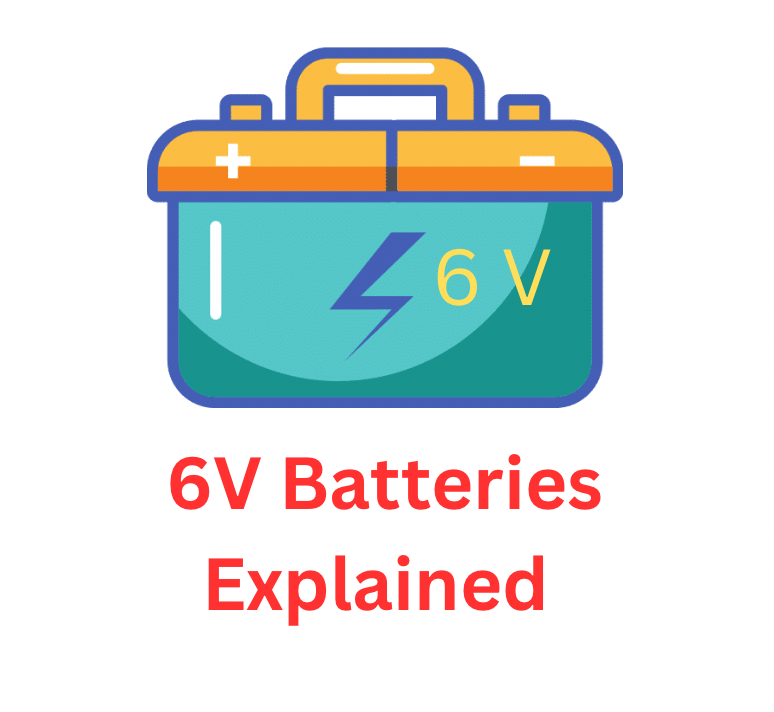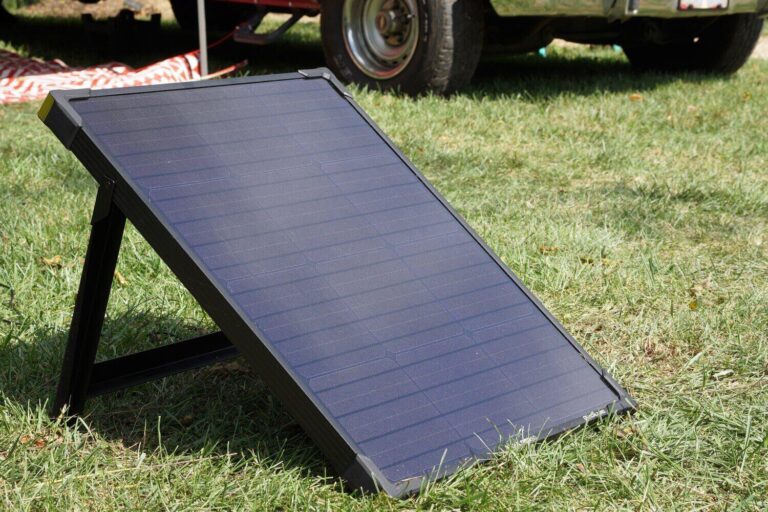Understanding 6 volt RV batteries: Maximising your adventures.

Battery voltage is a big deal, especially when it comes to how well your RV’s systems run. So, why do so many RV owners swear by 6-volt batteries?
Ive created this guide for myself to understand this topic in further detail hope you find it useful .
I have researched the topics and found what I believe to be some of the best videos out there please subscribe to the channels if you found the content of value thanks!
RV batteries are the heartbeat of your mobile adventures. They’re the power source behind your lights and fridge, Learn what makes them absolutely essential for your vehicle’s electrical system.
In simple terms, a 6-volt RV battery belongs to the lead-acid battery family, but it’s designed for something special: deep cycle use. This means these batteries are built to handle being discharged and recharged multiple times without losing their capacity (amp hours) or getting damaged.
There are other variations like gel RV batteries and lithium batteries that offer even more durability with less fuss over maintenance.
But it’s not just about knowing the different battery types; it’s also about understanding things like amp hour capacity and recharge capabilities. This knowledge can help you make smart choices, whether you’re deciding between a single battery setup or wiring multiple ones together for extra power.
So, whether you’re out in the wilderness away from power hookups or harnessing the sun’s energy with solar panels, knowing how these house batteries work will keep your adventures rolling smoothly.
Understanding 6-volt batteries is crucial for various applications, from golf carts to RVs and small solar power systems. These batteries have a consistent 6-volt power output, thanks to their unique design with thicker plates and ample electrolyte. This design allows them to provide a steady current for an extended period.
Unlike other batteries, 6-volt batteries are tough cookies. They can be fully discharged and recharged, making them perfect for deep-cycle applications. Their durability and ability to handle heavy usage make them stand out. Plus, they offer generous storage capacity, ideal for those needing long-lasting power.
By getting the lowdown on 6-volt batteries, you can make informed decisions when choosing and maintaining these powerhouses for your specific needs.
Benefits of 6 Volt RV Batteries
6 Volt RV Batteries are a top pick for adventure enthusiasts and RV owners, and it’s not hard to see why.
First and foremost, these batteries, including gel RV batteries and lead-acid ones, pack more amp hours. In plain terms, this means they deliver more battery power for longer stretches compared to their counterparts.
What sets them apart even more is their sturdy design. 6-volt deep cycle batteries are built with thicker plates, giving them the muscle to handle repeated discharge cycles better than alternatives like lithium batteries or single battery setups.
If you’re into dry camping without electrical hookups or rely heavily on solar panels in your travel trailer, a genuine deep cycle battery like the 6V version is a perfect fit.
Here’s the lowdown on why 6 Volt RV batteries are a hit with RV owners:
- Ample Capacity: These batteries bring serious power to the table, keeping all your RV’s electrical gadgets running smoothly for extended periods.
- Built to Last: Designed for deep cycling, 6 Volt RV batteries can handle multiple discharges and recharges without losing their mojo. This makes them perfect for those long camping adventures.
- Weather Warriors: They’re tough cookies, capable of shrugging off harsh weather conditions and extreme temperatures, making them reliable year-round.
- Budget-Friendly: Plus, they won’t break the bank. 6 Volt RV batteries offer reliability, durability, and affordability – a triple win for any RV enthusiast.
Why Use 6-Volt Batteries?
- Higher Capacity: 6-volt batteries offer more storage capacity, ensuring longer runtime for your RV’s appliances and devices.
- Durability: Their larger size and robust construction make them more durable and resistant to damage, ideal for rugged RV adventures.
- Deep Cycle: 6-volt batteries are designed for deep cycling, allowing them to be fully discharged and recharged without performance degradation.
- Reliability: They provide a steady and reliable power supply, crucial for powering your RV’s electrical systems.
- Dry Camping: 6-volt batteries excel in dry camping situations when there are no electrical hookups available.
- Amp Hours: Pairs of connected 6-volt batteries often offer more amp hours than a single equivalent voltage lead-acid battery.
- Backup Power: They are commonly used in backup power systems, ensuring your RV stays powered during outages.
- Renewable Energy: 6-volt batteries are suitable for use in renewable energy setups, such as solar power systems.
- Versatility: They are versatile and can handle various applications, from RVs to golf carts and more.
- Cost-Effective: While lithium batteries have their advantages, 6-volt batteries are often more budget-friendly for RV owners.
Pros & Cons of Both 12V verses 6V Batteries
12V Batteries:
- Pros:
- Higher Capacity: 12V batteries often have a higher capacity, making them suitable for larger and more power-hungry electrical devices.
- Automotive Standard: They are the standard in automotive applications, making them readily available for replacement.
- Cons:
- Cost: Generally more expensive compared to their 6V counterparts.
6V Batteries:
- Pros:
- Cost-Effective: Typically less expensive and budget-friendly.
- Longer Lifespan: Tend to have a longer lifespan than 12V batteries.
- Suitable for Smaller Applications: Ideal for smaller applications, but may not provide sufficient power for larger devices.
- Cons:
- Lower Capacity: Lower capacity compared to 12V batteries.
Deep Cycle Batteries:
- Pros:
- Common in RVs: Deep cycle batteries are common in most RVs.
- Affordability: A standard choice for many travel trailer owners due to affordability and easy replacement.
- Recharge Capacity: Gel RV batteries and true deep cycle batteries offer higher recharge capacity but come at a higher cost.
- Multiple 6V Batteries: Two connected 6V lead-acid house batteries can provide more energy than a single 12V battery, making them ideal for dry camping without electrical hookups.
- Maintenance: Requires strict maintenance routines, including regular water level checks in each cell.
- Weight: Heavier compared to other battery types, which may affect your vehicle’s load limit.
- Cons:
- Maintenance Intensive: Require regular maintenance, including water level checks.
Lithium-Ion Batteries:
- Pros:
- Advantages: Longer lifespan, higher efficiency, and lower maintenance requirements.
- Cost: Comes with higher upfront costs compared to traditional lead-acid options.
- Amp Hour Capacity: A pair of wired-together 6-volt batteries typically offers larger storage potential compared to their counterparts.
- Decision Factors: Ultimately, the decision depends on individual needs, budget constraints, and personal preferences.
- Cons:
- Higher Initial Cost: Lithium-ion batteries are more expensive upfront.
This comprehensive information should help you weigh the pros and cons of each battery type for your specific needs and preferences.
How to Connect RV Batteries
Properly connecting your RV batteries is essential for maximizing their performance and ensuring a reliable power supply for your adventures. Here’s how to do it, broken down into easy-to-follow bullet points:
1. Understand Battery Wiring Options:
- You have two wiring options: series and parallel, depending on your voltage and capacity needs.
2. Connecting Batteries in Series (To Increase Voltage):
- Connect the plus (+) end of one battery to the minus (-) side of another.
- This setup increases the overall voltage of your battery bank.
3. Connecting Batteries in Parallel (For More Amp Hours):
- If you want to maintain the same voltage but increase amp hours, wire the batteries in parallel.
- Connect all positive terminals together and then all negative terminals together.
- This setup provides more power capacity without changing the voltage.
4. Prioritize Safety:
- Always put safety first when working with lead-acid or lithium batteries.
- Wear protective gear and exercise caution during the connection process.
5. Use a Battery Monitoring System:
- Invest in a reliable battery monitoring system.
- It helps you keep tabs on your battery’s capacity and overall health, ensuring a longer lifespan.
6. Seek Expert Advice:
- Incorrect connections can lead to damage not only to your RV batteries but also to other electrical components, such as solar panels (if connected).
- It’s a good practice to consult an expert before making any changes to your RV’s battery setup.
7. Determine Battery Type and Number:
- First, identify the type and quantity of batteries your RV uses, typically either one or multiple 12-volt batteries.
8. Parallel Connections:
- If connecting in parallel, link the positive terminal of the first battery to the positive terminal of the second battery using a battery cable.
- Then, connect the negative terminal of the first battery to the negative terminal of the second battery.
- This setup increases overall battery capacity without changing the voltage.
9. Series Connections:
- For series connections, connect the positive terminal of the first battery to the negative terminal of the second battery using a battery cable.
- Repeat this process for all the batteries.
- Series connections increase voltage while maintaining the same battery capacity.
By following these steps and taking safety precautions, you’ll be able to connect your RV batteries correctly, ensuring a reliable and efficient power supply for your travels.
Types of RV Batteries
There are several types of RV batteries available in the market. The most common type is the lead-acid battery, which is affordable and widely used.
Within the lead-acid category, there are two subtypes: flooded batteries and AGM batteries.
Flooded batteries require regular maintenance and have vent caps to release gases, whereas AGM batteries are maintenance-free and offer better performance.
Another popular option is lithium-ion batteries, which are more expensive but have a longer lifespan, are lightweight, and provide consistent power.
Lithium-ion batteries are also not affected by extreme temperatures, making them ideal for all types of weather conditions. Overall, the choice of RV battery depends on individual needs, budget, and desired performance.
Deep-Cycle RV Batteries
These are designed to provide a consistent and reliable source of power for extended periods of time.
Unlike regular automotive batteries, which are designed to provide a quick burst of energy to start the engine, deep-cycle batteries are designed to be discharged and recharged repeatedly without degrading their performance.
This makes them ideal for powering the various appliances and devices found in RVs, such as lights, refrigerators, and entertainment systems. Deep-cycle batteries come in different sizes and capacities to meet different power demands, and they can be recharged using a generator, solar panel, or shoreline connection.
Maintaining and monitoring the battery’s charge level is important to ensure it lasts as long as possible and to prevent damage from overcharging or complete discharge.
Lithium RV Batteries
These are becoming increasingly popular among RV owners due to their numerous advantages over traditional lead-acid batteries.
One of the biggest benefits is their lightweight design, which can significantly reduce the overall weight of the RV and improve fuel efficiency. Lithium batteries also have a longer lifespan, lasting up to ten times longer than lead-acid batteries, which means fewer replacements and less maintenance.
Additionally, they have a higher energy density, allowing for more power in a smaller, compact size. This is especially important for RV owners who rely on their batteries to run various appliances and systems while off-grid.
While lithium RV batteries may have a higher upfront cost, their long-term benefits make them a worthwhile investment for any serious RV enthusiast.
Flooded Lead-Acid Battery
Also known as a wet cell battery, is a type of rechargeable battery that uses a liquid electrolyte to store and release electrical energy.
It consists of lead plates immersed in a sulfuric acid solution, which serves as the electrolyte. When the battery is charged, the chemical reaction between the electrolyte and the lead plates generates electrons, creating a flow of electrical current.
However, these batteries require regular maintenance to ensure they are properly filled with distilled water to replenish the evaporation.
Additionally, they can release potentially harmful gases and require ventilation to avoid buildup. Despite these drawbacks, flooded lead-acid batteries are still commonly used in various applications, including automotive vehicles and uninterruptible power supply systems.
Absorbed Glass Mat (AGM)
Is a type of high-performance lead-acid battery. It is commonly used in vehicles, boats, and recreational vehicles. AGM batteries are regarded as maintenance-free because they are sealed, preventing any leakage or spillage of electrolyte.
The design of AGM batteries involves a highly porous mat made of glass fibers between the battery plates. This mat absorbs and immobilizes the sulfuric acid electrolyte, enabling the battery to remain in any position without spilling or leaking.
AGM batteries have a longer life span compared to traditional lead-acid batteries, as they are more resistant to vibration and can withstand deep cycling. They also have a low self-discharge rate and are capable of delivering high currents.
Overall, AGM batteries are an excellent choice for applications that require reliable power supply in demanding environments.
The 12-Volt Battery IN Brief
The 12-Volt battery is mainly an Absorbed Glass Matt (AGM) widely used in different applications. It’s prized for its high performance and durability.
AGM batteries feature a special design with a glass mat separator between the positive and negative plates. This separator is highly porous and adept at absorbing and containing the electrolyte solution, preventing leaks.
The glass mat design also increases the battery’s surface area, leading to better energy storage and discharge rates. AGM batteries have low self-discharge rates, meaning they can hold a charge for extended periods, making them perfect for long-term power storage.
In summary, AGM batteries are reliable and efficient power sources suitable for various applications.
Amp Hour Rating Explained
- Definition of Amp Hours (Ah): Amp hours represent the amount of electrical current a battery can provide over a one-hour period. It’s a measure of the battery’s capacity to deliver a certain amount of current for a specific duration.
- 6-Volt Battery and Amp Hours: When you see a rating like “X amp hours” on a 6-volt battery, it signifies the capacity of that battery to provide a particular amount of current over time. For example, a 6-volt battery rated at 200 amp hours (200Ah) can theoretically deliver 200 amps of current for one hour.
- Practical Use: In practical terms, amp hours are essential for understanding how long a battery can power your devices or appliances before needing recharging. If you have a 6-volt battery with a 200Ah rating and you have a device that consumes 10 amps of current, you can expect the battery to power that device for about 20 hours (200Ah ÷ 10A = 20 hours).
- Deep Cycle Batteries: 6-volt batteries are often used in deep cycle applications, such as RVs and golf carts, where they may be discharged significantly before recharging. The amp hour rating of these batteries is a critical factor in determining how long they can provide power in such scenarios.
- Multiple Batteries: In some setups, multiple 6-volt batteries may be connected in series or parallel to increase capacity. The total amp hours in such configurations would be the sum of the individual battery ratings.
12-Volt vs. 6-Volt Batteries: Myths and Facts
Myth 1: 12-Volt Batteries Always Provide More Power
- Fact: Voltage alone doesn’t determine a battery’s power. 6-volt batteries can provide as much power as 12-volt batteries; it’s the capacity (amp hours) that matters.
Myth 2: 6-Volt Batteries Are Less Durable
- Fact: 6-volt batteries can be highly durable, especially deep cycle variants, designed for repeated discharges. Durability depends on the battery type and usage.
Myth 3: 12-Volt Batteries Are Always Better for Starting Engines
- Fact: Both 6-volt and 12-volt batteries can start engines effectively. The key is choosing a battery with the right cold-cranking amps (CCA) rating for your vehicle.
Myth 4: 6-Volt Batteries Are Obsolete
- Fact: 6-volt batteries are still widely used in various applications, including golf carts, RVs, and renewable energy systems. They offer advantages like cost-effectiveness and longevity.
Myth 5: 12-Volt Batteries Are Always More Expensive
- Fact: While 6-volt batteries are often more budget-friendly, the cost depends on factors like battery type and brand. Premium 6-volt batteries can sometimes be pricier than standard 12-volt options.

Considerations Before Using 6-Volt Batteries
Before Using 6-Volt Batteries:
- Understand Device Power Requirements:
- Know the voltage and current draw of your appliances for compatibility and sufficient power supply.
- Assess Battery Capacity and Lifespan:
- 6-volt batteries come in various amp-hour (Ah) capacities; choose one that meets your energy needs.
- Evaluate Charging Requirements:
- Check if special chargers or voltage regulators are needed for the specific 6-volt batteries you have.
- Consider Battery Weight and Size:
- For portable devices, factor in the weight and size of the batteries; smaller and lighter options may be more suitable.
- Weight and Size: Ensure it fits your RV’s limited space comfortably and doesn’t exceed weight limits.
- Dimensions: Check if it fits in the designated compartment or requires modifications.
- Accessibility: Ensure easy access for maintenance.
- Installation Requirements: Some batteries may need venting systems or specific mounting orientations for optimal performance.

Disadvantages of 6 Volt Batteries.
Disadvantages of 6-Volt Batteries:
- Limited Capacity:
- Due to their lower voltage, 6-volt batteries generally have lower energy storage capacity compared to higher voltage options.
- This results in reduced power output and quicker discharge.
- Size and Weight:
- 6-volt batteries tend to be larger and heavier than higher voltage batteries, making them less portable and inconvenient for transport.
- Limited Device Compatibility:
- Many modern electronic devices are designed for higher voltage batteries (e.g., 9-volt or 12-volt), limiting the range of devices compatible with 6-volt batteries.
- Shorter Lifespan:
- 6-volt batteries may have a shorter lifespan compared to higher voltage alternatives.
- They may require more frequent replacement or recharging, leading to higher long-term maintenance costs.
Disadvantages of Gel Cell Batteries
Disadvantages of Gel Cell Batteries:
- High Initial Cost:
- Gel cell batteries tend to be more expensive than other battery types (e.g., lead-acid or lithium-ion), which can be a significant drawback for those on a tight budget.
- Limited Capacity:
- They have a lower energy density, meaning they can store less energy for their size, resulting in a shorter lifespan and reduced overall performance.
- Temperature Sensitivity:
- Gel cell batteries can be sensitive to temperature extremes, with extreme heat or cold negatively impacting their performance.
- Less suitable for use in environments with extreme weather conditions.
- Maintenance Requirements:
- Gel cell batteries require careful maintenance, including proper ventilation to dissipate heat and avoid gas buildup.
- Failure to maintain them properly can lead to reduced efficiency and longevity.
Disadvantages of Lead-Acid Batteries
Disadvantages of Lead-Acid Batteries:
- Size and Weight:
- Lead-acid batteries are heavy and bulky, making them unsuitable for portable applications and limiting their use in space-constrained industries.
- Low Energy Density:
- They have a relatively low energy density, meaning they can’t store as much energy per unit volume as other battery technologies like lithium-ion batteries.
- This results in lower energy storage capacity and a shorter lifespan.
- Toxic Materials:
- Lead-acid batteries contain toxic materials such as lead and sulfuric acid.
- Improper disposal or mishandling can pose significant environmental hazards and health risks.
- Maintenance Requirements:
- Lead-acid batteries require regular maintenance and monitoring to ensure optimal performance.
- This includes periodic refilling of electrolyte and protection against overcharging.
While lead-acid batteries have their advantages, it’s essential to consider these limitations and drawbacks when choosing a battery technology for a specific application.

Extending Battery Life on Your Adventures
Maintaining your 6-volt RV batteries is essential to ensure they last longer and provide reliable power for your adventures. Here’s how to extend their lifespan, presented in a user-friendly bullet list:
1. Proper Storage:
- Always store your RV batteries correctly when not in use to preserve their power.
2. Avoid Overcharging:
- Overcharging can significantly reduce a battery’s capacity and overall lifespan, so be mindful of this.
3. Routine Battery Service:
- Regular service checks are crucial for optimal performance, whether you have lead-acid or lithium batteries.
4. Choose the Right Charger:
- Selecting the right charger is essential to maintain ideal recharge capacity, ultimately extending the longevity of your deep cycle batteries. Check out our guide on how to choose the best RV Battery Chargers.
5. Battery Weight and Cable Selection:
- Poorly selected cables can affect amp hour output, so consider wire thickness and length.
- An effective monitoring system helps keep track of voltage levels, preventing unexpected breakdowns during dry camping.
Bonus Tips for Device Battery Life:
- When exploring the outdoors, maximize your device’s battery life with these tips:
- Dim the screen brightness and reduce the screen timeout.
- Disable unnecessary background apps and turn off push notifications.
- Switch to airplane mode or low power mode in weak signal areas to reduce power consumption.
- Carry a portable charger or power bank for backup power when away from outlets.
By implementing these strategies, you can not only extend the lifespan of your RV batteries but also ensure you have enough power for all your outdoor adventures.
Extending the Life of 6 Volt RV Batteries:
- Proper Charging Techniques:
- Use solar panels or generators to keep batteries charged and healthy.
- Understand the charging stages: absorption, float, and equalization.
- Absorption: Charges at constant voltage until 80% capacity.
- Float: Maintains lower voltage to avoid overcharging.
- Equalization: Balances cell voltage and prevents stratification.
- Smart Charging Controllers:
- Monitor and regulate the charging process.
- Prevent overcharging and deep discharging.
- Adjust charge rates based on battery condition and temperature.
- Offer various modes like maintenance and desulfation.
- Avoid Overcharging or Deep Discharging:
- Monitor battery levels closely.
- Implement proper charging practices to prevent heat buildup and irreversible damage.
Life Expectancy of 6 Volt RV Batteries
- Average Lifespan: Typically 3 to 7 years.
- Factors Impacting Lifespan:
- Frequency of use: Frequent discharge and recharge may reduce lifespan.
- Battery quality: High-quality deep cycle batteries last longer.
- Charging process: Overcharging or undercharging can damage batteries.
- Proper storage during inactivity prevents self-discharge.
- Maintenance and Inspection:
- Regularly clean terminals and check fluid levels.
- Identify and address issues before they become major problems.
In conclusion, by following proper usage habits and regular maintenance, you can maximize the life expectancy of your 6-volt RV batteries.

Maintaining the Life of Your RV Batteries
Maintenance Tips for Longevity:
Inspect Battery Connections:
- Regularly check for corrosion or loose terminals.
- Clean corroded terminals with a baking soda and water mixture followed by a rinse for good electrical contact.
Clean Battery Surfaces:
- Regularly clean battery surfaces to prevent dirt buildup.
- Use a soft cloth and mild detergent solution to wipe down surfaces.
Proper Storage:
- Store batteries in a cool, dry place during extended periods of non-use.
- Remove accessories that draw power when in storage to prevent unnecessary discharge.
Additional Tips for RV Battery Maintenance:
Monitor Battery Levels:
- Check battery levels regularly, especially before trips.
- Monitor and maintain the proper water level by adding distilled water if necessary.
Keep Batteries Clean:
- Dirt and corrosion can affect battery performance.
- Regularly clean with a brush.
Avoid Overcharging or Undercharging:
- Overcharging can cause excessive heat and damage.
- Undercharging can lead to sulfation, reducing battery capacity.
Proper Storage:
- Store RV batteries in a cool, dry place.
- Disconnect to prevent unintentional drain during the off-season or periods of non-use.
Consider Battery Maintenance Device:
- Invest in a battery maintenance device to monitor levels and prevent overcharging.
Troubleshooting Common Issues with 6 Volt RV Batteries.
Battery Not Holding a Charge Ever wondered why your battery seems drained? It could be sulfation, a common issue when lead-acid batteries aren’t fully charged regularly. The fix? Keep your batteries charged up regularly, and during storage, use a trickle charger to prevent sulfation from striking.
Voltage Drops Quickly Under Load If you notice rapid voltage drops, it might not just be your battery’s fault. The problem could be lurking in your vehicle’s electrical system. It’s wise to call in a professional electrician to inspect for potential faults causing these voltage drops.
Overheating During Charging or Use An overheated battery can spell trouble. It might signal overcharging or an internal short circuit within one of its cells. For safety’s sake, leave the detective work to the pros.
Low Voltage: This sneaky issue can be caused by age, poor maintenance, or a wonky charging system. Start by checking the water level in the battery and top up with distilled water if needed. Ensure clean and tight battery connections. If problems persist, it might be time for a replacement.
Dead Battery: If your battery won’t hold a charge or gets your RV going, it might be time for a new one.
Charging Woes: Always use a charger designed for 6-volt batteries and follow the manufacturer’s charging instructions.
By being aware of these common battery problems, you’ll keep your RV adventures rolling smoothly. Stay powered up and hit the road with confidence!
Causes of RV Battery Failure
Causes of RV Battery Failure:
Overcharging:
- Continuous charging at a higher voltage than recommended.
- May result from a faulty RV charging system or incorrect charger usage.
Undercharging:
- Incomplete charging leading to sulfation.
- Can occur due to infrequent RV use or malfunctioning charging systems.
Temperature Extremes:
- Extreme heat can cause water loss and drying of the battery.
- Extreme cold can impact the battery’s ability to maintain a charge.
- Important to keep the battery in a temperature-controlled environment and monitor water levels.
Battery Age:
- RV batteries typically last around 3-5 years.
- Failure is likely if the battery is not replaced within its lifespan.

Charging Your RV Battery
1. Using a Generator:
- Generators provide a reliable source of power for charging your RV battery.
- They are versatile and can charge your battery even when there’s no sunlight or while the RV is stationary.
- However, generators can be noisy, which might be bothersome in quiet campgrounds.
- You’ll need to have a supply of fuel on hand, which can be an extra expense.
2. Charging with Solar Panels:
- Solar panels offer an eco-friendly and silent way to charge your RV battery.
- They harness energy from the sun and convert it into electrical power.
- Solar charging is ideal for extended stays in sunny locations, as it requires direct sunlight.
- The downside is that it can take longer to fully charge your battery compared to generators or engine charging.
3. Using the RV Engine for Charging:
- Charging your RV battery while driving is a convenient option.
- It allows you to multitask, as you’re already on the move.
- The alternator in your RV’s engine charges the battery as you drive.
- However, this method may take longer to charge the battery compared to other dedicated charging methods.
- Ensure your RV’s engine charging system is in good condition for optimal results.
No matter which charging method you choose, it’s crucial to:
- Regularly check your battery’s water levels to prevent damage.
- Ensure proper battery maintenance, such as cleaning terminals and securing connections.
- Follow safety precautions and manufacturer guidelines for charging your RV battery.
Understanding RV Solar Systems in Brief
Understanding RV solar systems might seem overwhelming at first, but let’s simplify it:
- RV solar systems use solar panels on the roof to turn sunlight into electricity.
- This electricity goes into special batteries made for long-term use.
- These batteries store the energy for when you need it, even if you’re not near a power source.
- An inverter turns this stored electricity into the kind your appliances and devices use.
By knowing these basics, you can choose the right solar panels, batteries, and inverters for your RV.

Choosing the Right Battery Size and Voltage
When picking the right battery, remember these factors:
- Battery size depends on your available space and intended use.
- Small batteries work for tight spots, while larger ones with more capacity fit where you have room.
- Battery voltage must match your device’s voltage specs to avoid damage.
- Different battery chemistries offer various features, so choose the one that suits your needs for best performance and battery life.
Mi Top 10 Battery Tips to Extend the Life of your RV Batteries
- Proper Charging: Ensure your batteries are charged correctly using a suitable charger designed for deep-cycle batteries. Overcharging or undercharging can significantly reduce battery life.
- Regular Maintenance: Implement a routine maintenance schedule, including checking water levels (for flooded lead-acid batteries), cleaning terminals, and inspecting for corrosion.
- Equalization Charging: If you have flooded lead-acid batteries, perform periodic equalization charging to balance the cells and prevent sulfation.
- Temperature Control: Keep your batteries in a temperature-controlled environment. Extreme heat or cold can shorten battery life, so consider insulation or climate control.
- Avoid Deep Discharges: Try to avoid deep discharges, as this can be hard on batteries. Invest in a battery monitor to keep track of your battery’s state of charge.
- Proper Storage: If you store your RV for an extended period, either disconnect the batteries or use a battery maintainer to prevent them from discharging completely.
- Use High-Quality Batteries: Invest in high-quality 6-volt RV batteries from reputable brands to ensure better performance and longevity.
- Balance the Load: Distribute the electrical load evenly between your batteries to prevent overworking individual cells.
- Regular Testing: Periodically test your batteries’ capacity and voltage to catch any issues early and take corrective action.
- Educate Yourself: Stay informed about best practices for battery maintenance and follow manufacturer guidelines to get the most out of your RV batteries.
By following these tips, you can significantly extend the life of your RV’s 6-volt batteries, ensuring reliable power during your adventures.
Maintenance and Safety Tips
Taking care of your 6-volt RV batteries is key to keeping them going strong and ensuring they perform at their best.
1. Capacity Check: Start with a regular check of your battery’s capacity. A trusty battery monitoring system can do the trick. Why is this important? Well, you don’t want your adventure to come to a halt because your batteries run out of juice.
2. Stay Connected: Keep those battery terminals clean as a whistle. Regular cleaning prevents corrosion from building up and messing with your battery’s connections.
3. Fluid Top-Ups: If you’ve got flooded deep cycle batteries, remember to use distilled water for top-ups. But here’s a tip: not all RV battery types need this. Gel RV batteries and lithium ones are set-it-and-forget-it when it comes to fluids.
4. Storage Wisdom: When it’s time to store your batteries, take them out of the vehicle, and find a cool, dry spot for them. Keep a trickle charger connected to keep them in top shape.
5. Sun Power: If you’re into dry camping or going off the grid, consider adding solar panels to the mix. They’ll give your batteries a boost and reduce your reliance on shore power during those long trips.
6. Safety First: Last but not least, always think safety. When dealing with these heavy-duty true deep cycle batteries, gear up with protective gear to keep things accident-free.
Maintaining your house batteries isn’t rocket science, but it does need some TLC and attention. Now that we’ve got the maintenance part down, let’s dive into troubleshooting common issues with these mighty power sources.
Maintenance and safety tips are essential for keeping equipment and machinery in tip-top shape. Regular maintenance ensures everything runs smoothly and helps prevent costly breakdowns. Scheduled inspections and timely repairs or replacements are crucial. Safety protocols, like wearing protective gear and following equipment guidelines, are vital to prevent accidents and injuries.
FAQs
How Does a Solar Panel Work for an RV Battery Charger?
Solar panels work by converting sunlight into electricity through a process called the photovoltaic effect. When the sun’s rays hit the solar cells on the panel, the energy from the photons is absorbed by the semiconducting material within the cells.
This creates an electric field across the layers, causing electrons to be knocked loose from their atoms. These free electrons are then captured and directed using metal contacts on the solar cell to form an electric current. The generated electricity flows through a charge controller, which regulates the voltage and current to protect the batteries from overcharging.
The charge controller ensures that the batteries are charged efficiently and extends their lifespan. Once the electricity is in the batteries, it can be used to power various devices in an RV, such as lights, appliances, and electronic gadgets.
The solar panel continuously generates electricity as long as there is sunlight, providing a renewable and sustainable source of power for the RV battery charger. Overall, solar panels are a reliable and eco-friendly solution for charging RV batteries, allowing for off-grid or environmentally conscious camping experiences.
How Long Do Deep-Cycle RV Batteries Last?
Deep-cycle RV batteries can last anywhere from 4 to 8 years, depending on a variety of factors. These factors include the quality of the battery, the amount of use it undergoes, and how well it is maintained.
High-quality batteries that are used regularly and properly maintained will generally last longer than lower-quality batteries that are not used often or are not taken care of. It is important to note that deep-cycle batteries are designed to be discharged deeply and recharged repeatedly, unlike starter batteries that are used to start the engine.
This repeated discharging and recharging can cause wear and tear on the battery over time. It is recommended to regularly check the battery’s water levels and keep it fully charged, as well as store it in a cool and dry area when not in use. By properly caring for and maintaining the deep-cycle RV battery, its lifespan can be extended, allowing RV owners to enjoy their trips without worrying about a dead battery.
How to Connect RV Batteries
To connect RV batteries, you first need to determine the type and number of batteries your RV has. Usually, RVs have either one or multiple 12-volt batteries.
If you have multiple batteries, they can be connected in parallel or series depending on your RV’s electrical system. For parallel connections, connect the positive terminal of the first battery to the positive terminal of the second battery using a battery cable.
Then, connect the negative terminal of the first battery to the negative terminal of the second battery. This will increase the overall battery capacity without changing the voltage. For series connections, connect the positive terminal of the first battery to the negative terminal of the second battery using a battery cable.
Repeat this process for all the batteries. Series connections increase the voltage while maintaining the same battery capacity.
How long do 6 Volt batteries last on one charge.
The lifespan of a 6-volt battery on one charge can vary depending on several factors. First, the capacity of the battery itself plays a significant role. Higher capacity batteries can store more energy and thus last longer on a single charge.
Additionally, the usage pattern and intensity of the device being powered by the battery also affects its lifespan. If the device draws a high amount of power consistently, the battery will drain quickly. On the other hand, if the device draws power intermittently or at a low rate, the battery’s lifespan will be extended.
Furthermore, the quality of the battery and its age can impact its longevity. High-quality batteries tend to have a longer lifespan than their lower-quality counterparts. It is also worth noting that 6-volt batteries are commonly used in various applications such as golf carts, emergency lighting, and recreational vehicles. In these instances, the battery’s lifespan can differ based on the specific usage requirements and maintenance practices.
Generally speaking, a well-maintained 6-volt battery can last anywhere from a few hours to several days on one charge, but it ultimately depends on the aforementioned factors.
How long do 6 volt deep cycle batteries last.
The lifespan of 6-volt deep cycle batteries can vary depending on several factors. On average, these batteries can last anywhere from 2 to 7 years. However, with proper maintenance and care, they can exceed this timeframe.
The life expectancy of a deep cycle battery primarily depends on the frequency of use and the depth of discharge. A battery that is consistently discharged to a low level will have a shorter lifespan compared to one that is only partially discharged.
Additionally, the number of charging cycles a battery undergoes also affects its longevity. Regularly charging the battery and avoiding overcharging or discharging it completely can help prolong its life. Environmental factors such as temperature and humidity can also impact the battery’s lifespan.
Extreme temperatures can cause the battery to degrade faster, while maintaining the battery in a controlled environment can extend its lifespan. Ultimately, the lifespan of a 6-volt deep cycle battery is influenced by various factors, and proper maintenance is crucial to ensure optimal durability.
Do i need 1 or 2 batteries for my RV
When it comes to powering your RV, having the right batteries is essential. Depending on your RV’s energy needs, you may need one or two batteries to ensure a smooth and uninterrupted journey. One battery is commonly used for basic electrical functions such as lighting, water pumps, and appliances, while an additional battery may be needed for more power-demanding equipment like air conditioning or a refrigerator.
It’s crucial to choose the right type of battery for your specific requirements. Deep cycle batteries are a popular choice for RVs as they provide a steady and reliable source of power over extended periods of time.
They are designed to handle numerous discharge and recharge cycles, making them ideal for extended trips or boondocking adventures.
Additionally, Investing in high-quality batteries will ensure longer lifespans and better performance. To maximize the lifespan of your batteries, it’s important to properly maintain and recharge them regularly. Overall, having one or two batteries for your RV is crucial for a comfortable and hassle-free camping experience.
How do i know when my RV battery needs replacing.
One way to determine if your RV battery needs replacing is to check its voltage level. You can use a voltmeter to measure the battery’s voltage. A fully charged battery should typically have a voltage of around 12.6 to 12.8 volts.
If the voltage reads significantly lower than this, it may be a sign that the battery is getting old and no longer holding a charge effectively. Another indicator is the battery’s age. RV batteries generally have a lifespan of about 3 to 5 years, depending on various factors such as usage and maintenance.
If your battery is reaching or exceeding this age range, it might be a good idea to start considering a replacement. Pay attention to the battery’s performance. If you notice a decrease in how long it can power your RV’s appliances or if it struggles to start the engine, it could be a sign of a deteriorating battery.
Finally, physical signs such as corrosion on the battery terminals or a bloated appearance can also indicate that it is time to replace the battery.
How to connect Two 6V batteries
How much do 6 Volt RV batteries cost.
The cost of 6-volt RV batteries can vary depending on the brand, quality, and capacity. On average, you can find these batteries ranging from $100 to $300. The price difference can be attributed to factors such as the type of battery, the technology used, and the overall build quality.
The capacity of the battery, which is measured in ampere-hours (Ah), can also impact the cost. Higher capacity batteries will usually come at a higher price. It’s important to note that investing in a high-quality battery is crucial for the smooth operation of your RV’s electrical system. Cheaper batteries may not last as long or provide sufficient power for your needs.
It’s worth considering the long-term savings that can be achieved with a reliable battery that offers good performance and a longer lifespan. It’s recommended to consult with reputable RV dealers or battery experts to ensure you select the right battery for your specific RV requirements and budget.
Conclusion
Maximizing the lifespan and performance of your 6 Volt RV batteries requires proper charging techniques, regular maintenance, and troubleshooting common issues when they arise.
By implementing smart charging controllers and carefully monitoring your batteries’ charge levels, you can avoid overcharging or deep discharging that can harm their health. Regularly inspecting battery connections for corrosion and cleaning battery surfaces will help prevent potential short circuits caused by dirt buildup.
Additionally, storing your batteries in a cool and dry place when not in use will extend their longevity. By following these tips and staying proactive with maintenance practices, you can ensure that your 6 Volt RV batteries power your adventures for many years to come with maximum efficiency and reliability
Written by Rich
Other blogs discussing around the topic of Batteries , Solar and portable power banks are below
Best Rv Batteries for BoonDocking
Lithium RV Batteries:The Ultimate Guide
Portable Solar Panels for RV’s
Portable Solar Panels for RV’s : Mini Guide
RV Batteries: Beginners Guide to Choosing and Installing 2023





